Cat Lover Feels She Will Be A Better Hooman For Her Sister's Kitten, And Wonders How She Can Buy It Without Hurting Her Feelings
Becoming a first-time pet owner can cause a lot of anxiety. Researching the animal you are planning to adopt or buy is a great thing, but it can only inform you so far.
Nothing compares to actually taking care of the pet in your home. Some aspiring pet owners "borrow" or offer to pet-sit their friend's cat or dog before adopting one for themselves.
One unforeseen pitfall when pet-sitting someone else's cat or dog is that you could realize you are not cut out to be a pet owner. On the other hand, it might just be the last push you need to go to a shelter immediately to find your own kitten or pup.
Following that logic, OP took care of her younger sister's 4-month-old kitten for a week. Kristine knew OP had been thinking of getting a cat for a while and readily agreed to let her have the kitten as a trial.
OP met the kitten, Pumpkin, for the first time when Kristine and Martin dropped her off at her house. They spoke at length about what Pumpkin liked and what she needed.
During the conversation, OP asked them how they had been faring with a cat in their house. She brought it up since she heard Kristine tell Pumpkin to be "super annoying" while she was with OP to give her a dose of what it's really like to have a cat.
Kristine and Martin weren't thrilled to have Pumpkin, and taking care of her made them realize they wanted a dog instead

The couple even said that they will never get another cat after Pumpkin, and as soon as she is "out of their lives," they will adopt a dog
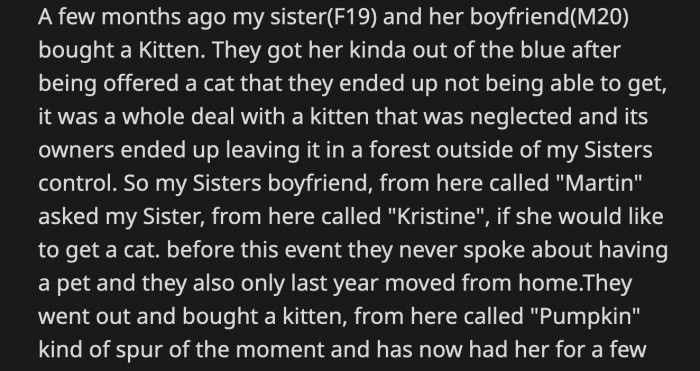
OP is worried that Pumpkin will become an outside cat if her sister can't wait that long to get a dog
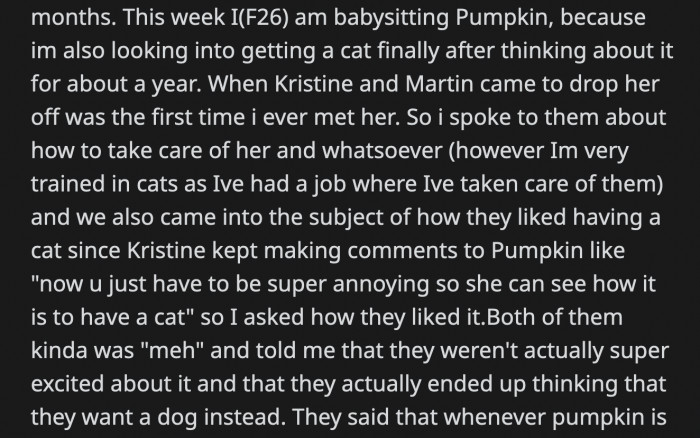
Navigating Family Dynamics in Pet Ownership
The decision to purchase a pet can evoke complex emotions, particularly when family members have differing desires. Research in family psychology indicates that such dynamics often reflect deeper issues of communication, responsibility, and emotional investment.
In this case, the sister's realization of wanting a dog after getting a kitten suggests a potential misalignment of expectations and emotional readiness for pet ownership.
Navigating Family Relationships and Pet Ownership
This scenario highlights the complexities of family dynamics, particularly when it comes to shared responsibilities and emotional connections to pets.
Research indicates that family members often have differing expectations regarding pet care, which can lead to misunderstandings.
In this case, the sister's desire for a dog after getting a kitten showcases the evolving nature of family roles and relationships.
OP saw how amazing a cat Pumpkin is while she was taking care of her. She said Pumpkin is exactly the kind of cat she wants.
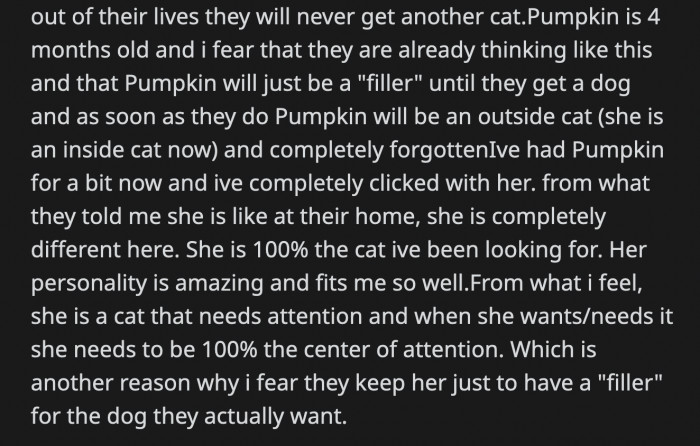
OP and her girlfriend have been debating whether she should ask Kristine if she can buy Pumpkin. She's afraid that asking the question could potentially hurt her sister's feelings.
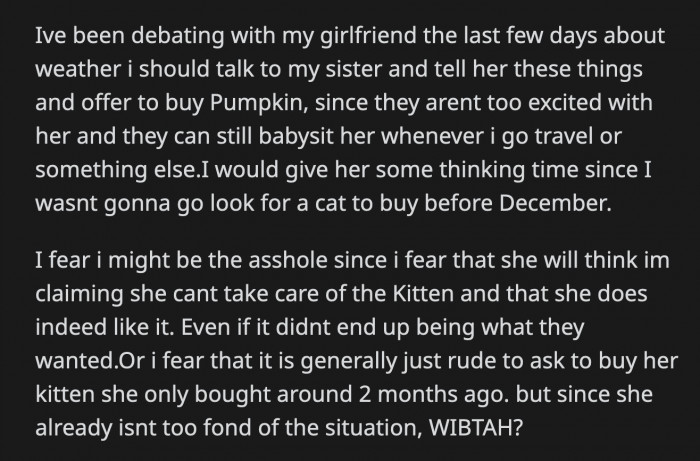
OP wouldn't be an a**hole if she asks whether she can buy Pumpkin from her sister since they are not as enthusiastic about having her

Studies show that when family members do not share the same views on pet care, it can lead to conflict and feelings of resentment. The differing desires for a cat versus a dog may represent broader themes of autonomy and choice within the family.
Understanding these dynamics is crucial for navigating potential conflicts effectively.
Understanding the motivations behind pet ownership decisions can provide insight into these dynamics.
Studies show that individuals often form deep emotional attachments to pets, which can influence their decisions and priorities.
The sister's realization that she wants a dog may reflect her evolving understanding of her own preferences and responsibilities within the familial context.
In her inquiry, OP shouldn't imply that Kristine and Martin can't take care of Pumpkin the way she can. She should only inform them about her interest in adopting her if they ever plan to do it.

There are no real a**holes in this story. However, OP shouldn't really ask to buy Pumpkin according to this comment. OP should wait for her sister to open the discussion of rehoming Pumpkin before jumping in with an offer.
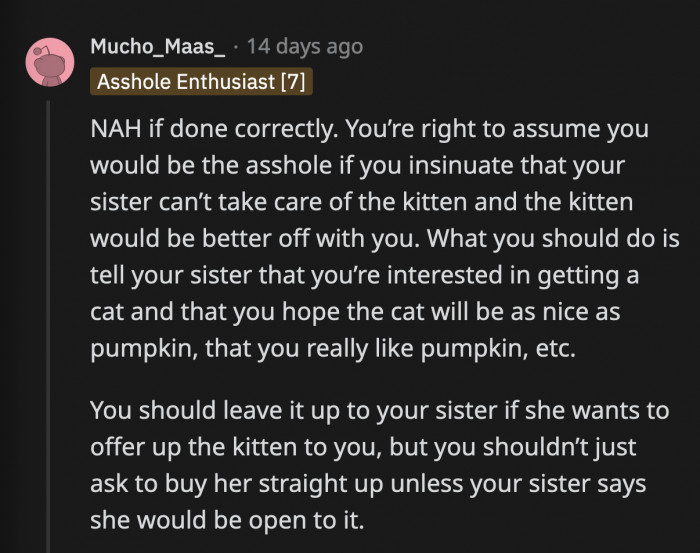
Redditors came up with non-antagonistic ways for OP to broach the subject of wanting Pumpkin as her pet
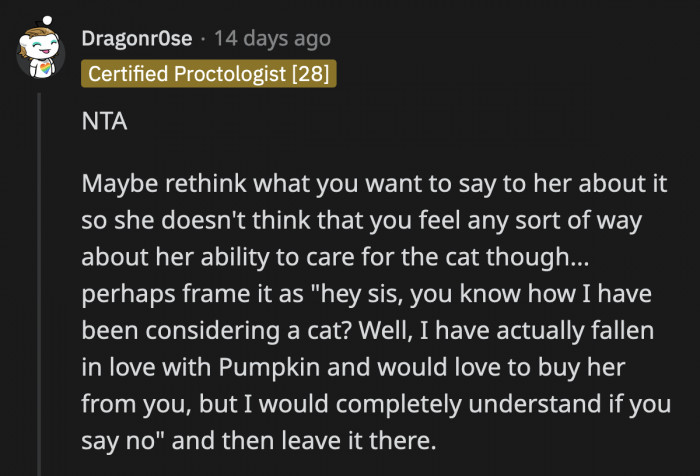
Understanding Emotional Investment in Pets
Emotional investment in pets can significantly influence family dynamics. Research by Dr. John Archer highlights that pets are often seen as extensions of ourselves, leading to strong emotional attachments that can complicate family decisions.
In this instance, the sister's desire for a cat may reflect her personal attachment style and the need for companionship, which may not align with her sister's desires.
The Role of Communication in Family Dynamics
Effective communication is crucial for navigating conflicts related to pet ownership and family expectations.
According to Dr. Ramani Durvasula, a clinical psychologist, "Open dialogue is essential in resolving conflicts; it allows family members to voice their concerns and fosters understanding." Encouraging family members to express their feelings about pet care can help establish clear expectations and responsibilities.
OP shouldn't imply that she would be a better owner than her sister

If her sister feels attacked or judged by OP, she will never let Pumpkin be around OP again. Worse, it can affect their relationship in the long run if OP handles this the wrong way.

OP has to keep it vague and focus on how enamored she is with Pumpkin instead of getting into the specifics of why they are a better owner-pet match
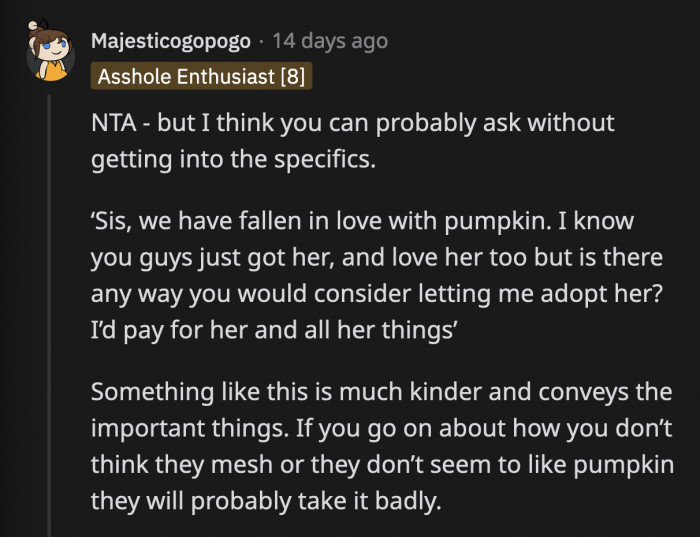
To facilitate healthier discussions around pet ownership, experts recommend practicing active listening and ensuring all family members feel heard.
Encouraging open dialogues about the responsibilities and emotional commitments associated with pet ownership can help families reach a consensus.
Using 'I' statements can also reduce defensiveness and foster understanding.
Additionally, exploring the underlying emotional motivations behind pet ownership can enhance understanding within the family.
Studies indicate that discussing the emotional significance of pets can lead to greater empathy and cooperation among family members.
This dialogue can create a more supportive environment for navigating decisions related to pet care.
OP will have a tricky conversation in the near future with her sister. How she handles it will determine her future as a cat owner and potentially alter her relationship with her sister.
It's a good thing OP went on Reddit because, after those suggestions, OP will at least have an idea of how to approach her sister. May Pumpkin be loved and cared for by either sister for the rest of her life.
Practical Solutions for Family Pet Responsibilities
To address conflicts around pet ownership, families can benefit from establishing clear guidelines regarding responsibilities and expectations.
Creating a family agreement about pet care can foster a sense of shared responsibility and accountability.
Additionally, involving all family members in discussions about pet selection can ensure that everyone's feelings and preferences are taken into account.
Ultimately, fostering a culture of open communication and collaboration within families can enhance relationships and improve pet care outcomes.
Encouraging family members to share their perspectives and work together can lead to healthier dynamics and shared joy in pet ownership.
Creating a supportive environment around pet responsibilities can strengthen family bonds and improve overall well-being.
Psychological Analysis
The dynamics of family relationships can significantly impact decisions regarding pet ownership and care.
Recognizing the differing emotional motivations and responsibilities within a family is crucial for fostering understanding and collaboration.
Analysis generated by AI
Analysis & Alternative Approaches
This situation emphasizes the importance of communication and understanding within families regarding pet ownership.
Research indicates that establishing clear expectations and guidelines can enhance relationships and foster collaboration.
Ultimately, creating a shared vision for pet care responsibilities can lead to positive outcomes for both pets and families.
The Role of Compromise in Family Decisions
Compromise is essential in family decision-making, especially regarding shared responsibilities like pet ownership. Research shows that families who engage in collaborative problem-solving are more likely to maintain harmony and mutual respect.
In this case, finding common ground between the desire for a cat versus a dog could lead to a more supportive family environment.
Encouraging family members to express their needs and preferences openly can lead to successful compromises. Setting up regular family meetings to discuss pet care responsibilities can also promote cooperation and prevent conflicts.
These strategies can help families navigate the emotional complexities of pet ownership more effectively.
The Emotional Impact of Pet Ownership
Pet ownership can evoke a variety of emotions, from joy to frustration. Research from the American Psychological Association indicates that pets can enhance emotional well-being but also require significant emotional investment.
Balancing the desires of multiple family members can create tension, as seen in this case, where differing preferences for pets lead to conflict.
Analysis & Alternative Approaches
Understanding the emotional landscapes of family dynamics is essential for navigating discussions about pet ownership. Research suggests that open communication, compromise, and active listening can help families align their desires and responsibilities, leading to a more harmonious environment.



